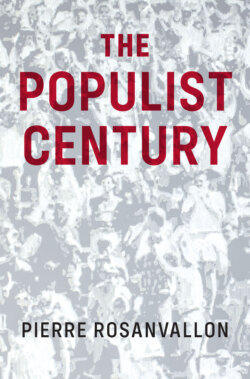Читать книгу The Populist Century - Pierre Rosanvallon - Страница 11
Notes
Оглавление1 1 I should emphasize that the same thing happened earlier to the word “democracy,” especially in the United States. At the turn of the nineteenth century, it was an insult to be called a “democrat” in that country. The term was equivalent to “demagogue,” and “democracy” at that time meant “mob rule” or “reign of the passions of the populace,” in the words of the founding fathers and their descendants. It was a provocative move when the Republicans of the day (Jefferson’s party) renamed their organization “Democratic Party” in the late 1820s. On this point, see Bertlinde Laniel’s documented history, Le mot “democracy” et son histoire aux États-Unis de 1780 à 1856 (Saint-Étienne: Publications de l’Université de Saint-Étienne, 1995).
2 2 Interview in L’Express, September 16, 2010. Mélenchon had said the same thing in his book Qu’ils s’en aillent tous! Vite, la révolution citoyenne (Paris: Flammarion, 2010): “The fine folk, the satisfied folk, their story-tellers and all the sermonizers who take the high ground can choke on their indignation. Let them brandish their pathetic red cards: ‘Populism!’ ‘Out of control!’ Bring it on!” (pp. 11–12).
3 3 I myself have taken that reductive approach in the past, by considering populism as a caricature of the counter-democratic principle; see my Counter-Democracy: Politics in an Age of Distrust, trans. Arthur Goldhammer (Cambridge: Cambridge University Press, [2006] 2008).
4 4 Dossier “Les 36 familles du populisme,” Éléments, no. 177 (April–May 2019): https://www.revue-elements.com/produit/familles-du-populisme-2/.
5 5 Nevertheless, we must salute the effort of conceptualization made by Ernesto Laclau and Chantal Mouffe, on the left. These authors have no counterparts on the right.
6 6 This ungainly term, translating the French démocrature, appears to have been adopted in English in recent years to label a democracy that has features in common with a dictatorship, or a dictatorship that purports to be a democracy. –Translator’s note.
7 7 In La démocratie inachevée: Histoire de la souveraineté du peuple en France (Paris: Gallimard, 2000).
8 8 In an interview in the Financial Times, June 27, 2019: https://www.ft.com/content/878d2344-98f0-11e9-9573-ee5cbb98ed36.
9 9 See the programmatic speech he delivered at Bǎile Tuşnad in Romania, 24 July 2017: https://visegradpost.com/en/2017/07/24/full-speech-of-v-orban-will-europe-belong-to-europeans/.
10 10 Moreover, this regime had restored universal suffrage, which the republicans in charge had eviscerated in 1849.
11 11 This is where the weakness lies in approaches that treat the problem as a “pathology” of democracies. They imply that the existing democracies constitute successful embodiments of the democratic project, a referential norm from which populisms would constitute deviations. This is to neglect the structural character of democratic indeterminacy and the fact that democracy is consequently an unstable regime that is constantly exploring its own aporias. I myself used that terminology in the earliest writings I devoted to the question: see “Penser le populisme,” Le Monde, July 22, 2011.
